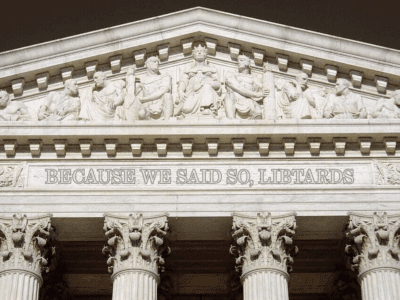The Pro-Environmental Lochner Court
How a conservative Court defended environmental protection a century ago.
Like today’s Court, the Supreme Court a century ago was dominated by conservatives. The Lochner era, from around 1900 to 1935, was named after the most notorious case of that period. The Lochner case, which struck down a maximum hours law for workers, epitomized the conservative Supreme Court of that era. Yet that conservative Court also ruled on many occasions in favor of environmental protection.
Two years after the Lochner decision, the Court decided Georgia v. Tennessee Copper. The defendant owned a copper smelter in Tennessee. The resulting air pollution was causing dramatic harm downwind in Georgia. The Supreme Court upheld Georgia’s right to file a lawsuit directly in the Supreme Court itself for relief. The Court emphasized the special sovereign interest that a state government had over its environment: “This is a suit by a state for an injury to it in its capacity of quasi-sovereign. In that capacity, the state has an interest independent of and behind the titles of its citizens, in all the earth and air within its domain. It has the last word as to whether its mountains shall be stripped of their forests and its inhabitants shall breathe pure air.” Thus, “it is a fair and reasonable demand on the part of a sovereign that the air over its territory should not be polluted on a great scale by sulphurous acid gas, that the forests on its mountains, be they better or worse, and whatever domestic destruction they have suffered, should not be further destroyed or threatened by the act of persons beyond its control, that the crops and orchards on its hills should not be endangered from the same source.” Please keep in mind that this was a Court that was famous, if not infamous, for its conservative activism.
In 1911, just six years after Lochner, the Court decided Light v. United States. Light involved a rancher who was grazing his stock in a national forest without a permit. The Court upheld the constitutional power of Congress to establish the national forests. In another 1911 case, Grimaud v. United States, the Court upheld the power of government officials to prohibit grazing, turning away an argument that Congress had unconstitutionally delegated regulatory powers to the officials.
Four years later, the Court decided Hadacheck v. Sebastian. A land owner had been operating a perfectly legal business quarrying clay and manufacturing bricks. He had acquired the land before it was annexed by the growing city of Los Angeles. But the city of Los Angeles adopted an ordinance banning this activity in certain parts of the city. He alleged that his property was worth $800,000 with the brick operation but no more than $60,000 without it. Nevertheless, the Court rejected the argument that this regulation was a taking of his property without just compensation. It spoke in sweeping terms of the city’s power to regulate harmful uses: “It is to be remembered that we are dealing with one of the most essential powers of government — one that is the least limitable. It may, indeed, seem harsh in its exercise, usually is on some individual, but the imperative necessity for its existence precludes any limitation upon it when not exerted arbitrarily. A vested interest cannot be asserted against it because of conditions once obtaining.”
In 1920, the Court decided Cameron v. United States, upholding Teddy Roosevelt’s use of the Antiquities Act to protect the Grand Canyon. As against the claim that the Canyon didn’t qualify for protection as a national monument of scientific or historical value, the Court said that “it is the greatest eroded canyon in the United States, if not in the world, is over a mile in depth, has attracted wide attention among explorers and scientists, affords an unexampled field for geologic study, is regarded as one of the great natural wonders, and annually draws to its borders thousands of visitors.”
That same year, the Court decided Missouri v. Holland. Congress had passed a law protecting migratory birds, but the Court had struck it down on the basis that it exceeded Congress’s power under the commerce clause. But after a treaty with Canada protected migratory birds, the Court then upheld Congress’s power to legislate on the subject, based on a broad interpretation of the power to enter into and implement treaties. The Court emphasized the national interest in protecting the birds. Today’s conservatives regret the Court’s expansive reading of the treaty power, seeing it as a threat to state’s rights. But the conservative Court of the Lochner era was not similarly concerned.
I can’t pretend to have done a thorough search for all cases during this era bearing upon protection of the environment. Nonetheless, it is somewhat startling to see just how often the famously conservative Court of that time took the side of environmental protection. Perhaps today’s conservative Court might have something to learn from that history.
Postscript. After this was posted, I learned that Professor Kimberly Smith at Carleton College has actually written a book on the subject, which will appear in October from Kansas University Press. As she told me, The Conservation Constitution traces how, between 1870 and 1930, the conservation movement reshaped constitutional doctrine to support expanded state and federal authority to protect natural resources. In striking contrast to the usual “Lochner Era” story, she finds that the federal courts during this period were largely supportive of conservation policy. She argues that this favorable attitude owes a great deal to the scientific reputation of the USDA and the talented group of lawyers supporting conservation policy. I’m eagerly looking forward to reading the book.
Reader Comments
2 Replies to “The Pro-Environmental Lochner Court”
Comments are closed.







Interesting post. I noted the post and made some comments over at Volokh.
https://reason.com/2019/10/01/did-the-lochner-court-have-a-green-thumb/
Thanks, Jonathan.